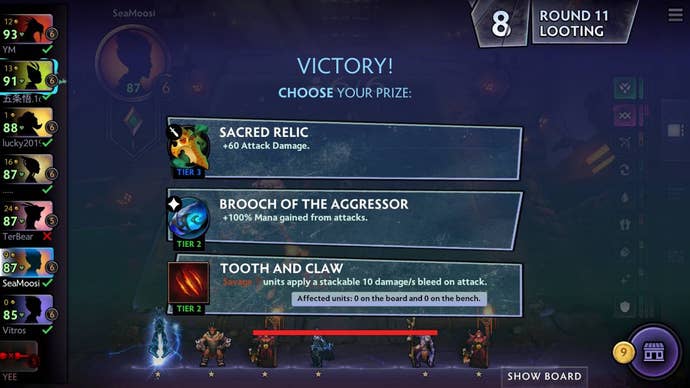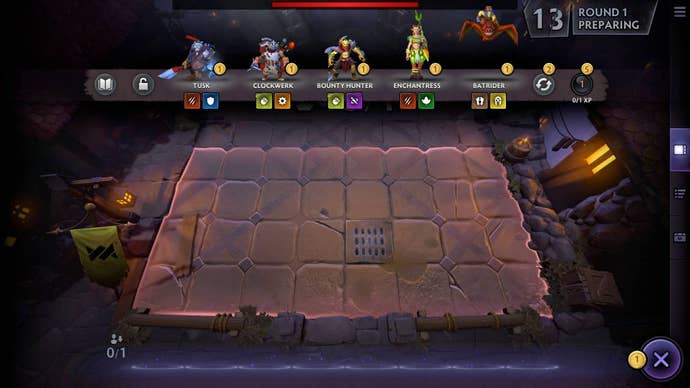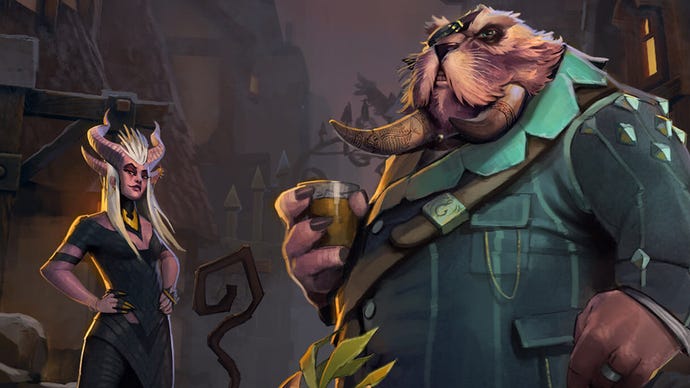After Playing a Bunch of Dota Underlords, Valve's Effort Feels a Little Too Safe
Underlords takes the tried-and-true Valve approach, for all that entails.
This article first appeared on USgamer, a partner publication of VG247. Some content, such as this article, has been migrated to VG247 for posterity after USgamer's closure - but it has not been edited or further vetted by the VG247 team.
Last week, Valve launched a closed beta of its take on the burgeoning autobattler genre called Dota Underlords. After negotiations with Drodo Studio-makers of the original Auto Chess mod for Dota 2-fell through, Valve is staking its own claim on the Steam platform. But while it's certainly Auto Chess, Underlords might not be distinct enough to stand out as other titans move into the space.
If you're not familiar with Auto Chess or why it's big, the simplest explanation is that its narrative eerily mirrors that of the original Defense of the Ancients. A mod gets extremely popular, and several companies start to siphon out bits and pieces, building their own version. In some cases, this leads to new ideas and clever twists that better the genre; but there are also imitators who just try to reskin the popular trend. It's what happened with Dota, which became Dota 2 as well as League of Legends and Heroes of Newerth, and with Riot and others stepping into the mix, it's looking to happen again with Auto Chess.
Underlords is not quite a carbon copy, but it is extremely familiar to anyone who's played Dota Auto Chess. The core loop remains: purchase units, arrange them on your board, fight other players' boards, repeat. You're still combining copies of the same unit to rank them up, fretting over formations, and occasionally fighting a few rounds against "neutral" units for rewards (more on that later).
Many of the units are the same, and have the same strengths and weaknesses as their mod counterparts. It's Valve's freedom to do so, as it owns the likeness of characters like Axe and Drow Ranger, and having that built-in comfort is certainly appealing to someone looking for a more polished version of Auto Chess.
But it's also restricting, as Valve's effort doesn't really stretch to tread new ground. Easily the most notable change is how Underlords handles items. Rather than a random drop, every round you fight against a neutral board is a designated "loot round," and you get to pick from a list of rewards for beating it. Items are sorted by tiers, similar to units, and while you can't combine to make anything, this does emphasize the importance of spending gold to level up a little more.
Some of these items aren't even items, but instead are new passives for your units. Certain ones will let you modify attributes or bolster the synergies you already have on your team, by turning Humans into Heartless (no, not that kind) or giving Warlocks more healing potency. This is easily the smartest change made, as it's the only one that gives you a chance to break the mold of the accepted "best metagame" of Auto Chess proper.

Other synergies have been slightly altered, like the addition of two Blood-bound units who soup up your squad after they die in battle and Hunters shooting additional shots. They end up meaning little in the scheme of things, as most units still serve a certain role. Druid synergy may be a little weirder (for the better) now, but Druids are still all about taking advantage of early game dips into multiple synergies.
Valve adds some polish to the experience, though not all of it for the best. Instead of scrolling around a map to see other boards, you're fixed onto a single camera view and can tab through other boards on the side. It's unwieldy, still a little hitchy, and honestly a little claustrophobic, which is something it's looking to address in a patch sometime today. But it definitely detracts from the shared experience, making you feel isolated. Thankfully, the units have a clean, almost cel-shaded outline that helps them pop a little, and the impact of large abilities like Kunkka's boat are clearly shown on the grid.
My greatest issue with Dota Underlords is that it simply fails to stand out. Beyond the loot and look, everything feels overly familiar. That's the same approach Dota 2 took-for a while, it was simply a cleaner-looking port-forward of the original Warcraft 3 mod, until it eventually overtook the mod and the spotlight. That could be the pace Dota Underlords sets, on a hopefully accelerated scale.

But companies are moving in quickly, and those that have are already bringing new takes. I played some of Riot Games' Teamfight Tactics, which is in its own test period right now, prior to E3 2019 and came away impressed. Even where it was rough, it had a clear focus on what it wanted to do and who it wanted to appeal to in the autobattler market.
Dota Underlords' target demographic seems to be simply those who liked Auto Chess and want to keep playing it. Valve's previous games, like Team Fortress 2 and Counter-Strike, have taken a similar path of offering a cleaner, dedicated experience. With Drodo leaving for its own version on the Epic Games Store, the Steam market is now open. I have no doubt Underlords will have its players, but for me personally, I'm hoping it starts to develop a little more of its own identity.


